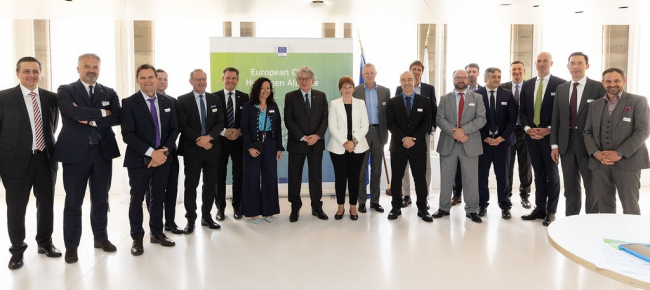Заголовок
EU electrolyser industry commits to boost manufacturing capacity tenfold by 2025Created date
10 05 2022Electrolyser manufacturers in Europe committed on Thursday (5 May) to increase their manufacturing capacity tenfold – to 17.5 GW per year by 2025 – as part of a joint declaration with the European Commission in Brussels.
The joint declaration was agreed upon during an electrolyser summit in Brussels and signed by 20 industry CEOs and the EU’s internal market Commissioner, Thierry Breton.
“Today, industry agreed to a tenfold increase in electrolyser manufacturing capacities in Europe. The Commission will support this important industrial upscaling for an industrial leadership in the clean energy technologies of the future,” Breton said.
The increase in capacity will enable the annual production of 10 million tons of renewable hydrogen in Europe by 2030, the Commission said in a statement.
The target aligns with plans presented in March by the EU executive to end the EU’s reliance on Russian gas “well before 2030” and accelerate the shift to clean energy sources.
The March plan, called REPowerEU, implies doubling the EU’s target for hydrogen production to 10m tons by 2030, an objective Breton said will require large amounts of electrolysers for hydrogen production.
To support the rapid upscaling of the industry, the joint declaration features a commitment by the EU executive to put in place a supportive regulatory framework, facilitate access to finance and promote efficient supply chains.
The joint statement says this includes “a legislative proposal on accelerated permitting for renewable energy projects” and faster examination of state aid notifications sent to Brussels. Electrolyser manufacturers, for their part, are committed to applying only with high-quality project proposals that are fully aligned with the EU’s climate targets.
Jon André Løkke, CEO of Nel Hydrogen and President of Hydrogen Europe, called it a “historic day” for the EU’s electrolyser industry.
“It’s time to walk the talk,” he added on Twitter, warning that there will be “no acceleration in electrolyser manufacturing in Europe without adequate regulatory and financial support.”
Raw material dependency
One of the key challenges ahead is access to affordable raw materials for electrolyser manufacturers, who often compete with other clean technology industries for scarce resources. “Many of these raw materials have been subject to significant price increases in recent months”, and the EU has “a strategic dependency” on them, the statement said.
To alleviate dependency issues, the joint declaration says the Commission will seek to conclude further raw material partnerships with foreign countries and work with the industry in areas like “strategic sourcing, processing, recycling and possible substitution” of key raw materials.
The EU is a world leader in electrolyser manufacturing. Although Chinese-made electrolysers are cheaper, they are also considered less efficient and reliable by Chinese makers themselves, reported Recharge, a specialised news outlet.
“German and European companies are excellently positioned to produce key components for the value chains of a hydrogen economy – vehicles, transport solutions, electrolysers, fuel cells,” said Veronika Grimm, an economist who sits on Germany’s hydrogen council.
Bosch, the German industry giant, is among the companies that are best placed to compete in the global electrolyser market. Earlier this week, the engineering and tech company announced a €500 million investment in research on hydrogen electrolyser components.
“We want to support the rapid development of hydrogen production in Europe with Bosch technology,” Bosch CEO Stefan Hartung said on 4 May, adding that his company would leverage its expertise in fuel cells to become a global leader.















